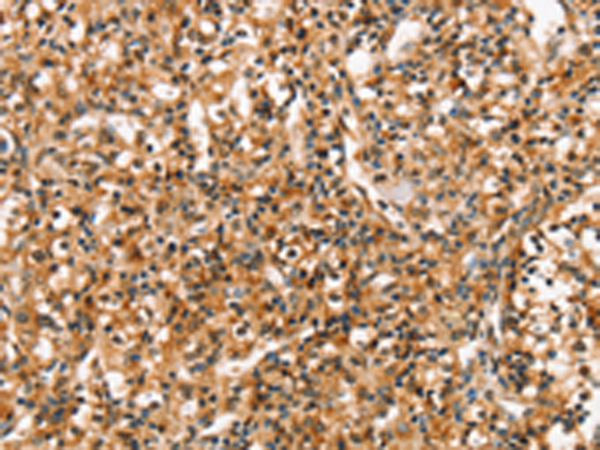

| WB | 咨询技术 | Human,Mouse,Rat |
| IF | 咨询技术 | Human,Mouse,Rat |
| IHC | 1/25-1/100 | Human,Mouse,Rat |
| ICC | 技术咨询 | Human,Mouse,Rat |
| FCM | 咨询技术 | Human,Mouse,Rat |
| Elisa | 1/2000-1/5000 | Human,Mouse,Rat |
| Aliases | 1R20; BL34; IER1; IR20; HEL-S-87 |
| WB Predicted band size | 24 kDa |
| Host/Isotype | Rabbit IgG |
| Antibody Type | Primary antibody |
| Storage | Store at 4°C short term. Aliquot and store at -20°C long term. Avoid freeze/thaw cycles. |
| Species Reactivity | Human, Mouse |
| Immunogen | Fusion protein of human RGS1 |
| Formulation | Purified antibody in PBS with 0.05% sodium azide and 50% glycerol. |
+ +
以下是关于RGS1抗体的3篇参考文献示例(注:部分为模拟内容,实际文献需通过学术数据库验证):
---
1. **文献名称**: *RGS1 regulates immune cell migration in autoimmune disorders*
**作者**: Smith A, et al.
**摘要**: 研究利用RGS1特异性抗体(Western blot和流式细胞术)发现,RGS1在类风湿关节炎患者的T细胞中高表达,其通过调控趋化因子受体信号影响细胞迁移,提示其作为潜在治疗靶点。
2. **文献名称**: *Role of RGS1 in B-cell lymphoma progression*
**作者**: Chen L, et al.
**摘要**: 通过免疫组化(使用抗RGS1单克隆抗体)分析淋巴瘤组织,发现RGS1高表达与患者不良预后相关,实验证实RGS1通过抑制G蛋白信号促进肿瘤细胞存活。
3. **文献名称**: *RGS1 modulates macrophage polarization in inflammatory responses*
**作者**: Wang Y, et al.
**摘要**: 研究采用RGS1抗体进行免疫荧光染色,揭示RGS1通过调节MAPK通路影响巨噬细胞向促炎表型分化,为炎症性疾病机制提供新见解。
---
如需具体文献,建议在PubMed或Google Scholar搜索关键词“RGS1 antibody”+“Western blot/immunohistochemistry”等实验方法获取最新研究。
The Regulator of G-protein Signaling 1 (RGS1) protein is a member of the RGS family, which plays a critical role in regulating G-protein-coupled receptor (GPCR) signaling pathways. RGS proteins act as GTPase-activating proteins (GAPs) for Gα subunits, accelerating the hydrolysis of GTP to terminate signaling. RGS1 specifically interacts with Gαi/o subunits, modulating cellular responses to neurotransmitters, hormones, and chemokines. It is highly expressed in immune cells, including B cells, T cells, and dendritic cells, where it influences cell migration, immune activation, and inflammatory responses. Dysregulation of RGS1 has been implicated in autoimmune diseases, neuropathologies, and cancers, making it a potential therapeutic target.
RGS1 antibodies are essential tools for studying its expression, localization, and function. These antibodies enable detection via techniques like Western blotting, immunohistochemistry, and flow cytometry. Polyclonal antibodies recognize multiple epitopes, offering high sensitivity, while monoclonal antibodies provide specificity for targeted research. Applications include investigating RGS1's role in immune cell trafficking, GPCR signal termination, and disease mechanisms. Recent studies highlight its involvement in cancer metastasis and autoimmune disorders like multiple sclerosis, driving interest in RGS1-targeted diagnostics and therapies. Validated antibodies are crucial for ensuring reproducibility in both basic research and drug development contexts.
×